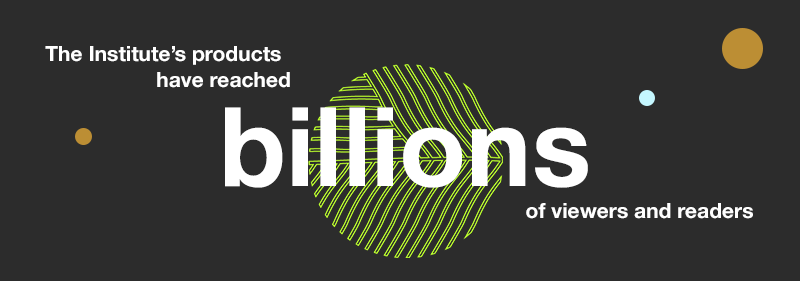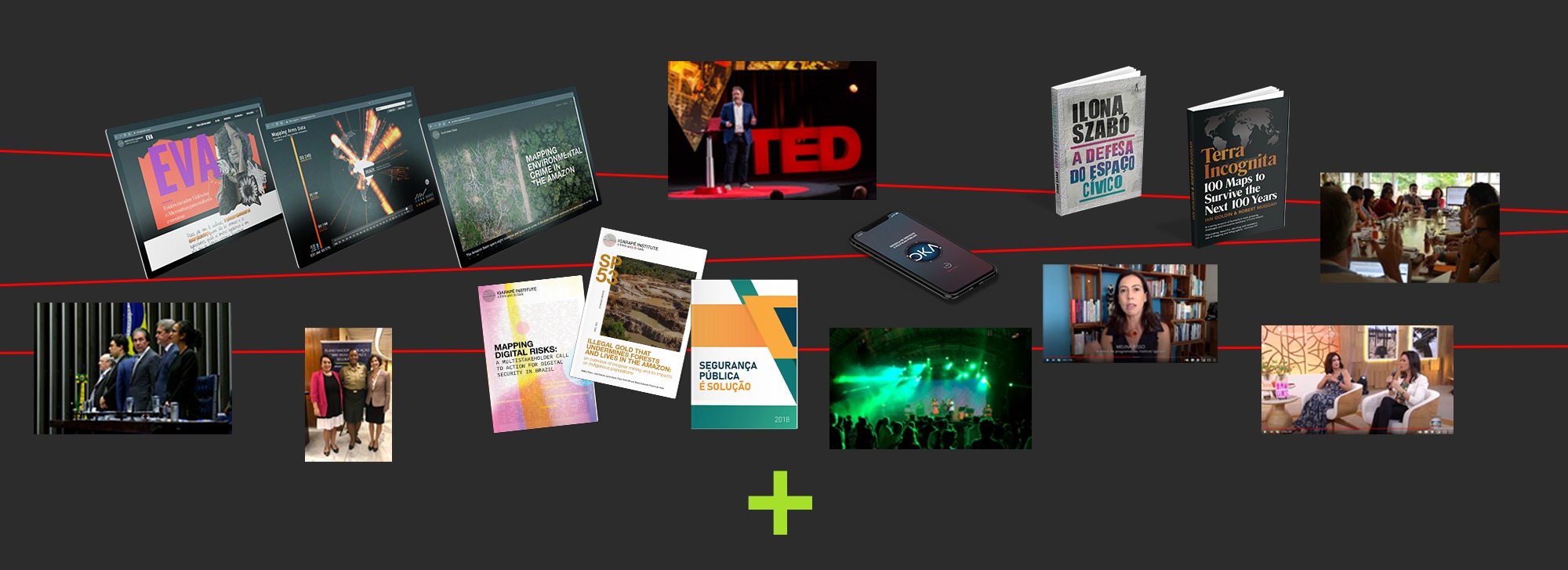
The Igarapé Institute uses cookies and other similar technologies to improve your experience, in accordance with our Privacy Policy and our Terms of Use, and by continuing to browse, you agree to these conditions.

The Igarapé Institute celebrates its tenth year anniversary in 2021! Over the past decade, the Institute has dramatically expanded research, awareness and action on public, climate, and digital security in Brazil, across Latin America and around the world. Speaking on the main stage of the world’s top conferences, summits and fora, Institute staff have sparked new thinking with decision-makers, influencers and citizens. Over the course of the past decade, the Institute’s products have reached literally billions of viewers and readers. In the process, the Institute has offered channels — like the small rivers, or “igarapés”, connecting to the Amazon river and the oceans beyond — to make positive change.

The Igarapé Institute’s researchers and data scientists have travelled to over 100 countries to engage on critical challenges ranging from peace and security, drug policy reform, the preservation of civic space, climate action and cyber governance. During this period, the Institute has produced over 300 publications, and roughly 37,000 media articles directly referencing the Igarapé Institute. Team members have participated in over 1,000 events, developed 28 new technological platforms, and penned more than 2,000 opeds — an average of one article every two days.

Igarapé Institute is committed to data-driven and evidence-informed policy and research studies on challenging issues facing Brazil and the rest of the world, often searching for “what works” from innovations wherever they might be. The Institute has developed path-breaking new tools on everything from mapping lethal violence and fragile cities to tracking successful citizen security measures and visualizing networks for vaccination response to pandemic outbreaks. Over the coming decade the Igarapé Institute will continue to help decision-makers and opinion-shapers navigate the world’s most pressing challenges, creating more secure and sustainable “igarapés” for our public, digital and environmental commons.
The Igarapé Institute has engaged with literally thousands of decision-makers and opinion-shapers from the international level to the grassroots to drive positive change. To inform and promote public debate, the Institute has developed strategic partnerships with leading news outlets such as the Folha de S.Paulo, Financial Times, New York Times, O Globo, and The Economist. The Institute has produced podcasts, campaigns, books, and music festivals to expand civic engagement. In the process, the Institute has helped shift public opinion, and public policy, on issues as wide ranging as drug policy, arms control, homicide reduction, smart cities, civic space, cyber governance and environmental crime.
Following a partnership with Google to map global arms flows in the early years of the organization’s development, the Igarapé Institute dramatically ramped-up its engagement in designing, developing and deploying new technologies. Over the past decade, the Institute has launched a series of data visualization tools such as EcoCrime (to map environmental crimes), EVA (to track violence against women), and the Forced Migration Observatory (to map displacement flows). The Institute also developed new technologies used by governments such as CopCast, a body-worn camera tested in Brazil, South Africa and the US. Other tools include the CrimeRadar, the ISPGeo and the Paraty Violence Prevention Observatory. Igarapé institute is also involved in developing a range of innovative civic apps to support marginalized communities, including the Child Security Index and OKA.
Igarapé Institute is a regular in international panels ranging from TED to the Paris Peace Forum, the United Nations General Assembly and the World Economic Forum. Team members have participated in public hearings and developed joined-up strategies with executive, legislative, judiciary leaders and civil society partners in dozens of countries. Their research has been cited in judicial decisions of the Brazilian Supreme Court. The Institute is also a leader of several civic networks and public commissions from the municipal to the national levels. The Institute also supports a wide range of high-level international networks and panels on issues of physical, digital and climate security. At the request of the UN Secretary General, the Institute also led a major global consultation on the future of multilateral action reaching almost 2,000 invited participants in 140 countries in six languages.
The Igarapé Institute has been awarded multiple prizes over the past decade, including consecutive awards from Prospect Magazine. For example, the Institute was designated the global think tank “One to watch” in 2018 and was the overall winner of the world’s “top social policy” think tank in 2019. The Institute’s president, Ilona Szabó, was also shortlisted for “Think Tanker of the Year 2020” and selected as the 5th most important thinker in the COVID-19 era. Additionally, the Institute was singled out as the top think tank for human rights in 2019 by Instituto Doar. In addition to receiving official commendations from the governments of Brazil, Canada and Norway, the Institute has won awards from the Eric Schmidt Family Foundation, Google, OnThinkTanks, Uber, Webby and other groups.
Research and recommendations generated by the Institute are routinely adopted by national governments, state authorities and mayors around the world. Team members have engaged in the design and development of legislative bills, national public policy plans, and the Igarapé Institute also provided inputs to Supreme Court judges, including as amicus curiae in important cases. Data-driven initiatives on arms control, cyber security, and women’s participation in peace-keeping missions have helped shape global treaties on the arms trade, UN agendas on women, peace and security, and norms on digital governance. What is more, products generated by the Institute have helped spark change across the Americas, including drug policy reform in Colombia, Mexico and Uruguay, as well as formal commitments to reduce homicide rates with the Organization of American States.

The Igarapé Institute uses cookies and other similar technologies to improve your experience, in accordance with our Privacy Policy and our Terms of Use, and by continuing to browse, you agree to these conditions.

O Instituto Igarapé utiliza cookies e outras tecnologias semelhantes para melhorar a sua experiência, de acordo com a nossa Política de Privacidade e nossos Termos de Uso e, ao continuar navegando, você concorda com essas condições.

